Olga Godim's Blog
September 30, 2025
Beatrice, the magic squirrel
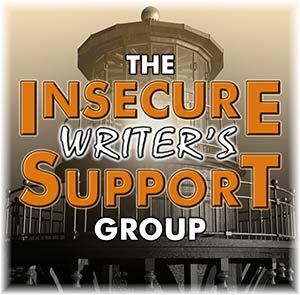
It’s the first Wednesday of the month again, time for a post for the Insecure Writer’s Support Group.
~~~~~~~~~~~~~~~~~~~~
OCTOBER QUESTION: What is the most favorite thing you have written, published or not? And why?
MY ANSWER: It is hard to choose. I have written many stories, some of them published, some not. My stories emerged in different lengths: novels, novellas, and short stories. All of them except one are speculative fiction: epic fantasy, urban fantasy, or science fiction. I have even written several magic realism short stories.

But to answer this question, I would probably go with the collection of short stories I self-published in 2014, the only book I ever published myself. I think it is still floating somewhere on e-book selling sites like Amazon, although it doesn’t sell anymore. I probably should do something about that, revamp it somehow, and I should definitely change its cover. I don’t like the one I have now.
This collection of 10 short urban fantasy stories is called Squirrel of Magic. The stories all share the same protagonists: a young witch Darya, who lives in Vancouver, Canada (my hometown) and her familiar, squirrel Beatrice. Of course, there is a dash of humor in all the stories. How could it be otherwise when a telepathic squirrel is involved? I had fun writing them all and coming up with Darya’s unbelievable adventures.
Whenever Darya needs a supportive ear or a sharp set-down, Beatrice is there for her, loving and grumbling. Together they disarm a bomb, eliminate a rogue warlock, and liberate a sylph from a garbage bin. And always help friends in trouble.
I found that I like writing series of stories focusing on the same protagonists. Besides, the shorter format – a short story or a novella – feels more natural to me than the longer format of a novel. Later on, I even wrote several different series of flash fiction stories for WEP, each series featuring its own protagonist. But Darya was my first foray into writing a series.
What about you? Have you written short stories? Series? Or is the novel your preferred format? Tell me in the comments.
September 2, 2025
Free will negated

It’s the first Wednesday of the month again, time for a post for the Insecure Writer’s Support Group.
~~~~~~~~~~~~~~~~~~~~
I’m going to skip this month’s question and instead ruminate on one of my least favorite tropes in fiction: the protagonist is forced into his/her actions by someone else. Like in the army, when a soldier is duty-bound to follow orders and can’t opt out, but without the military connotation.
I recently encountered this trope in Mimi Matthews’s new historical romance novel, Rules for Ruin. The book didn’t work for me, despite its excellent editing and the gorgeous cover, because the heroine didn’t act of her own volition.
Like in other stories of this ilk, the heroine of Matthew’s book seems hedged in by her own morality. She feels obligated to her former teacher, and when that teacher sends her into a perilous and morally ambiguous situation, she doesn’t feel that she can refuse, even though she would’ve never chosen that course of action of her own free will. Even more, her free will seems subjugated by the teacher’s. And the heroine reluctantly accepts that status-quo.
I abhor such stories. I think that if the characters must go into danger and mayhem, the least the authors can do is let them select their own paths. I always do that to my characters. Of course, I know that sometimes, circumstances direct our actions. A war or an illness or a dictatorship often leaves us bereft of choices. But when it is some high-ranking ‘manager’ that demands obedience, just because they can, and the heroes comply, for a variety of reasons, my reader’s soul rejects their predicaments. Like everyone else, I’ve lived through such experiences now and then, and I invariably hated it. I don’t have to read about it, too.
I wonder: am I alone in my strong distaste for tales like that? What do you think? Do you write your heroes into such pickles? Do you like reading such stories?
August 5, 2025
Thesaurus

It’s the first Wednesday of the month again, time for a post for the Insecure Writer’s Support Group.
~~~~~~~~~~~~~~~~~~~~
How often do you use a thesaurus – a dictionary of synonyms – in your writing? I use one quite often. When I write the first draft of anything – a newspaper article or a work of fiction or even a blog post – I’m usually in a hurry to get the story out there. So, I type the most common words that come into my mind, just to get past that scene, that description, and move on. But on the next revisit, I play with words. I want the most evocative words in my story, the synonyms that carry emotions and nuances. Here is when a thesaurus comes into play.
Before the internet became a ‘thing’, I used Roget’s Thesaurus for all my needs. I have a 1962 edition on my ‘writing’ shelf, and the book is well-used by now. It helped me a lot when I needed it most.
For this post, I looked into the history of Roget’s Thesaurus and found out that Peter Mark Roget published the first edition of his famous thesaurus in 1852. It has been continuously in print since then and remained widely used across the English-speaking world, even though there are other thesauruses out there. Roget’s wasn’t the first, but it became the most popular practically from the beginning. The name of its author – Roget’s – is even trademarked in the UK. In a sense, the title, Roget’s Thesaurus, has become almost a generic name for any thesaurus, even if it has nothing to do with Roget and his work.
An interesting tidbit: Roget’s original edition included 15,000 words. Each successive edition increased that number significantly. The most recent edition – the 8th – contains (as far as I know) 443,000 words.
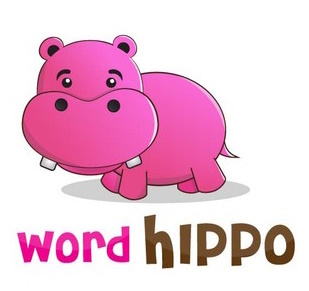
I have to admit I haven’t opened my Roget’s Thesaurus for a while. For the last decade or two, I have been using exclusively an online thesaurus. There are several available online for free, and I tried a few different ones over the years. My favorite is Word Hippo. I have an icon for it on my laptop screen. Every time I need to look up a synonym, or an antonym, or a definition, or even a rhyme, I opened that website. Its design and simplicity agree with me.
Do you use a thesaurus? In book format or online? Which online thesaurus is your favorite and why? Tell me in the comments.
July 2, 2025
The protagonist’s name

It’s the first Wednesday of the month again, time for a post for the Insecure Writer’s Support Group.
~~~~~~~~~~~~~~~~~~~~
Recently, I read (or tried to read) a fantasy novel by a bestselling author. She started her book with a prologue. It was told from the POV of some magical creature who didn’t participate in the further plot at all and only briefly materialized again in the epilogue. The story protagonist, when he initially appeared, wasn’t even mentioned by name for the first 10 pages. Guess what? I didn’t finish that book. Some other readers might enjoy it, but I was unhappy with the writer. Why would she withhold her hero’s name from me?
Then I read another book, a chic-lit, this one by another bestselling author, Susan Elizabeth Phillips: Simply the Best. It also started with a prologue, but the protagonist’s name was the first word on the first page. It was a wonderful book. I couldn’t stop reading it until I reached the end.
When I think back to the other books I liked or disliked as a reader, the ones I enjoy invariably have the protagonist pop up on the first page, often in the first paragraph. It is important to me who the book is about. Otherwise, why should I care?
As a writer, my own stories also start with the protagonist’s name on the first page, and more often than not in the first sentence. I think it is paramount for a writer to introduce her hero or heroine as quickly as possible.
What about you? Which approach speaks to you as a reader or a writer? How soon do you introduce your heroes in your own stories?
June 3, 2025
Changing your username

It’s the first Wednesday of the month again, time for a post for the Insecure Writer’s Support Group.
~~~~~~~~~~~~~~~~~~~~
Many of you know that I frequent the free image site Pixabay.com. It has a thriving community of photographers and digital artists. I habitually download their images and use them in my book cover collages. Recently, I encountered a strange phenomenon there. As I know the username of the artists I like, I often search the site specifically for them. Even if I don’t need any particular image, I enjoy seeing what the artists are doing, enjoy watching their latest creations. But sometimes, I can’t find them. Such situations upset me. They feel like I lost a friend.
At first, I thought they canceled their Pixabay account. It happens. I also made sure my spelling of their username was correct in the search box. Once, when that didn’t produce any positive results, I decided to search Google for one of their images I previously downloaded. And it was there alright, on Pixabay. But the username changed. When I encountered such a change several times, for different users, I started wondering: why would people do that? It makes them harder to find. Don’t they want to be found?
I know that sometimes creatives use different aliases for their works in different genres. Writers do that all the time: write romance under one pen name and science fiction under another. But I never encountered an occasion when a creator would change their name for all their work, both past and future. Maybe because Pixabay is a social media (to a degree), and the name change is easy to perform? Still, a username change doesn’t make sense to me. Do people change their username on Facebook? On Instagram? Does it make sense to you? Could you guess why users might do that? Tell me in the comments.
May 7, 2025
Contemplation on war

It’s the first Wednesday of the month again, time for a post for the Insecure Writer’s Support Group.
~~~~~~~~~~~~~~~~~~~~
I will forgo this month’s question because I want to talk about something else: WWII. When I grew up in Moscow, we celebrated the end of WWII on May 9. It was an official state holiday in Russia, with a military parade along the Red Square. Some of my older relatives fought in the war. One of them, Isaac, my great-uncle, was a military doctor during the war and stayed in the army for many years after, working as a doctor. One day, when I was in high school, we were together at a family gathering, celebrating May 9. Isaac got drunk and told me a story of his war service. I’ll never forget that story, even though it was over 50 years ago.
When the Nazis invaded Russia in 1941, Isaac was a medical student (he finished his studies after the war). He was drafted into the army and assigned to a field hospital. One of his duties there was sorting out the wounded soldiers after a battle. Isaac had to sort them into 3 categories, because the resources of any field hospital, in terms of medical personnel, space, and drugs, were extremely limited. The surgeons and nurses needed to know who to help first. Priorities had to be maintained.
The first category consisted of lightly wounded. They could go back to their units soon after surgery or other necessary treatments and perhaps a brief stay at the hospital. That group got quick and urgent care. The army needed those men back in the trenches.
The second group was the soldiers who needed serious treatments the field hospital couldn’t provide. Their healing would take time and effort, but their chances to get back to the front eventually and into more battles were high. That group were given first aid and scheduled for transportation into better hospitals far from the front lines, deep into the Russian territory.
The third group were those who would’ve needed extraordinary medical care to recover and were unlikely ever to return to the front. Maybe, if their medical care was adequate, they could’ve survived, but they could never be soldiers again. That group also received first aid, but not as quickly as the second group, and more often than not, they were not sent anywhere but stayed at the field hospital and were allowed to die in peace.
Even 3 decades after those horrible days of sorting his wounded, Uncle Isaac still felt uneasy about those soldiers. He acted on orders from his superiors and didn’t have any choices, but as a doctor, he still felt responsible, as if he personally condemned those men to die. I suspect that he would never have told me this story if he wasn’t so drunk.
We are all used to the stories of war being stories of heroism, courage, and fighting. There was no courage in Uncle Isaac’s story, no heroes, no fighting, just one young doctor reluctantly following orders, but I rarely heard or read such a poignant and painful story before or after. As a writer, I wonder: could I write a story imbued with such deep emotions without resorting to action scenes or gory descriptions? Can you? Have you? Tell me in the comments.
April 1, 2025
My friend – a fantasy character

It’s the first Wednesday of the month again, time for a post for the Insecure Writer’s Support Group.
~~~~~~~~~~~~~~~~~~~~
APRIL QUESTION: What fantasy character would you like to fight, go on a quest with, or have a beer/glass of wine with?
MY ANSWER: Fantasy is one of my favorite genres, so there are a few fantasy characters I’d like to be friends with, the ones I wouldn’t mind beside me in good times and bad times. One of them is Zoe Lalindar, the protagonist of Sharon Shinn’s fantasy novel Troubled Waters (2010).
The novel is the first in the series Elemental Blessings. Altogether, the series includes 5 novels. Each one has a different hero and heroine, but all of them are set in the same world, and many characters reappear in two or more novels, sometimes as leads, other times as support staff. Zoe is the heroine of the first novel, but she participates in 3 others. And although in those stories, she only makes a few cameo appearances, she steals the show every time she steps into the spotlight. Her personality is such a delightful blend of irreverence and power, compassion and loyalty, I consider her one of the best, most colorful heroines in the fantasy genre. Of course, I want to be her friend.
I like all the novels in that series, and as it is often the case with books I enjoy, I created mock covers for all of them. You can see them all here. My covers do not compete with the official publishers’ book covers, of course. Instead, they are meant simply as fan art, my tribute to the writer Sharon Shinn and her wonderful stories.
What about you? Does any fantasy character resonates with you? Or do you prefer characters in a different genre?
March 4, 2025
Elusive characters – good or bad?

It’s the first Wednesday of the month again, time for a post for the Insecure Writer’s Support Group.
~~~~~~~~~~~~~~~~~~~~
You all know by now that I make book covers. At first, I only created pre-made book covers, which came exclusively from my imagination. Then, I was lucky enough to attract some writers’ attention, and a couple people asked me to create book covers for them. Every single time, it was a marvelous experience to mesh my aesthetic vision to their specific story.
I’ve decided to make more of those, simply to enjoy the process. I selected a couple series of books I read and admired but didn’t like their covers much. So, I made my own covers for them, not for publication (they have already been published), just for myself, to have fun. My first attempt was a science fiction series by Michelle Diener, and I shared the results with this blog’s readers a few months ago.
My next similar project was the PALADIN series of fantasy novels (the sword and sorcery variety) by T. Kingfisher. Those of you who read fantasy probably know her. That particular series of hers includes 4 books (for now) and has covers that are mostly abstract, differing from each other by colors and some symbols pertaining to each particular story.
I adopted the same approach: no people on the covers, just symbols that define the lead characters. It was easy for the first three books. Their lead characters are, respectively: a perfumer, a local coroner, and a were-bear. The symbols leapt at me. Below are my covers for those 3 novels.
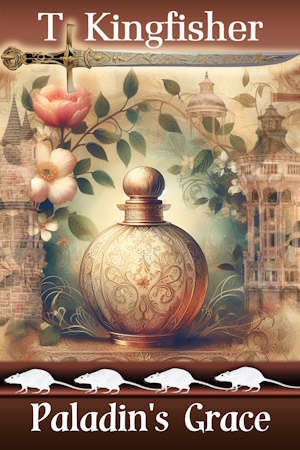
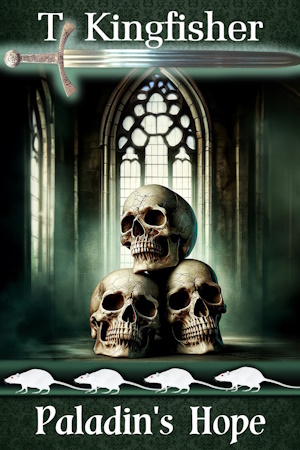
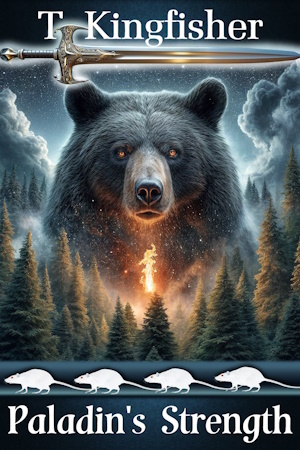
The novel #4 proved unexpectedly resistant. Its heroine is a professional spy, and she is freaking elusive. I wrecked my brain trying to come up with the symbols that would define her. Writing implements? Flowers? Weapons? Money? Nothing seemed to apply 100%, but eventually I came up with the couple versions below, although I can’t say I’m completely satisfied with either.
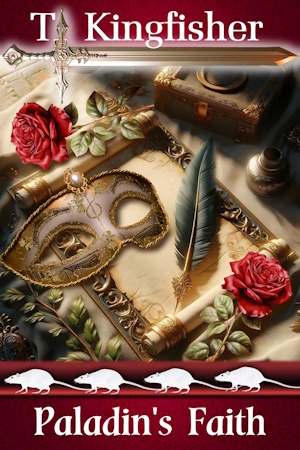
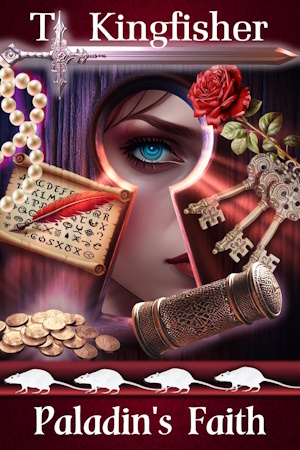
Which brings me to the point of this post. What do you think about elusive characters, characters that defy labels and categories? Do you enjoy reading about them? Do you write them? Tell me in the comments.
February 4, 2025
Book prices

It’s the first Wednesday of the month again, time for a post for the Insecure Writer’s Support Group.
~~~~~~~~~~~~~~~~~~~~
Every writer eventually arrives at a momentous decision: how to price their books. I buy lots of books, both digital and paper, new and used, so I have an opinion on book prices.
I have a Kindle reader, so I do most of my book shopping on Amazon. I have to admit that I never buy any new-to-me author’s books in paper format. They are often too expensive. Below is my book-buying policy, expressed as a bullet list.
I’m not familiar with the author, but I want to read their book (because someone recommended it, for instance). First, I try to find it at the library. If our library doesn’t carry the title or the author, I would try a kindle book. Usually, especially if they are self-published, they come cheap: from $0.99 to about $8. Even if I don’t like the book, I’m not out a great deal of money.I know and like the author. When they publish a new book, I again first check the library. If the library doesn’t have it, I would buy it as an ebook first, for almost any price. Most of them are still not too expensive: usually below $10. If I like it exceptionally well and re-read it at least once, I might splurge on the paper book.One of my favorite authors published a new book. I know her other books. I’ve read them all and re-read them occasionally. In this case, I go straight to Amazon and buy the paper book (if available).But there are unwelcome exceptions. One of them is the author Liz Williams. Someone recommended her novel Comet Weather to me, and I liked the description. I’ve never read her before and wanted to try her first. Unfortunately, she is not in our library system. The Amazon prices on her books, both digital and paper, are ridiculous. At least they are in Canada. I think $17 for a kindle book is excessive, especially when I’m not sure I want it. So, no Liz Williams for me, at least for now, and there are other writers like that. Don’t they want to attract new readers? Pricing their digital books too high is not the way to achieve that goal.
On the other hand, Mary Lancaster is another new-to-me writer. I discovered her only last year. Her historical romance books are priced reasonably low. The first book of a series is always less than $2. The others go up a bit – from $3 to $6. And guess what: I regularly buy her books. I’ve completed several of her series by now, and I’m going to read more of her. She is a prolific writer, and her stories make me happy. But I don’t think I’ll re-read any of her books, so I’m not going to buy any of them in paper format.
I do want to buy paper books by some other writers, but sometimes, they make it hard. For example, I love T. Kingfisher’s PALADIN series. I own all the books in the series in e-format and I’ve re-read them all. But when I logged in to Amazon to check her paper book prices, I was disappointed. She wants about $40 for each book. I guess I’ll keep to the kindle for now.
What about you? Do you buy ebooks priced over $10? What if you don’t know the author’s other works? How do you price your own books/ebooks?
January 7, 2025
My year 2024 in books

It’s the first Wednesday of the month again, time for a post for the Insecure Writer’s Support Group.
~~~~~~~~~~~~~~~~~~~~
I’ll skip this month’s question in this post. Instead, I want to talk about the love of my life – books. Specifically, books I read last year. My Goodreads stats told me that I read 151 books in 2024. Some of them were DNFs, but others were re-reads, which I don’t mark on Goodreads, so I think the number evens out.
The new and wonderful authors I discovered for myself in 2024 were:
Sofi Laporte’s and her historical romancesMary Lancaster’s PETTERIL mystery series and historical romancesGrace Burrowes’s A GENTLEMAN mystery seriesLinzi Day’s GRETNA GREEN seriesI will continue reading them in 2025 as well.
An ongoing fantasy series I keep reading and enjoying is Lois McMaster Bujold’s PENRIC. It had two new novellas published in 2024 – Demon Daughter and Penric and the Bandit. I’m so glad she continues writing these marvelous stories.
And finally, the book I liked best (one of them anyway) was the delightful Yangsze Choo’s The Fox Wife. It was also this year’s happy discovery for me. I feel quite adventurous with so many new authors that I tried in 2024.
To add some spice to this vaguely statistic post, I played a book title game with myself, and I invite you to play it with me. Below are 12 incomplete statements. I finished each statement with a book title – one of the titles I read last year.
I would describe the past year as: Mammoths at the Gates (Nghi Vo)I could have cried about: The Fox Wife (Yangsze Choo)I would love to have a respite from: Playing James (Sarah Mason)The biggest surprise for me last year: Petteril’s Portrait (Mary Lancaster)I always laugh out loud at: The Snails of Dun Nas (K.L. Noone)The best party I attended featured: Very Nice Funeral (Jennifer Crusie, Bob Mayer)My motto for the new year will be: Books & Broad Swords (Jessie Mihalik)I am most looking forward to: Small Magics (Ilona Andrews)A recurring dream I’ve had involved: The House of the Red Balconies (A.J. Demas)What you could see in my closet: Something Blue (Emma Jameson)The best job for me would be: Enthraller (Michelle Diener)What most people don’t know about me: Demon Daughter (Lois McMaster Bujold)What about you? Did you discover new authors in 2024? Could you answer at least one of the above questions in the comments? Do you play a different book game?



